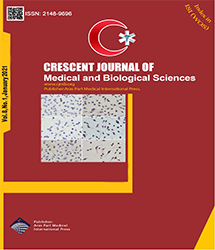
| Original Article | |
| Diagnostic Value of Chronic Inflammatory Factors in Non-muscle Invasive Bladder Cancer | |
| Nazi Aghaalikhani1,2, Nadereh Rashtchizadeh1,2, Pejman Shadpour3, Abdolamir Allameh4, Marzieh Mahmoodi5 | |
| 1Drug Applied Research Center, Tabriz University of Medical Sciences, Tabriz, Iran 2Department of Biochemistry and Clinical Laboratories, Faculty of Medicine, Tabriz University of Medical Sciences, Tabriz, Iran 3Hasheminejad kidney Center, Hospital Management Research Center, Iran University of Medical Sciences, Tehran, Iran 4Department of Clinical Biochemistry, Faculty of Medical Sciences, Tarbiat Modares University, Tehran, Iran 5Faculty of health and nutrition, Bushehr University of Medical Sciences, Bushehr, Iran |
|
|
CJMB 2021; 8: 042-047 Viewed : 4559 times Downloaded : 2384 times. Keywords : C-reactive protein, Inflammation, Non-muscle invasive urothelial bladder carcinoma, Interleukin-6, Tumor necrosis factor-alpha |
|
| Full Text(PDF) | Related Articles | |
| Abstract | |
Objectives: Chronic inflammation in urothelial tissues can lead to DNA damage and cancer formation. Inflammatory reactions in bladder cancer (BC) probably depend on the stages and grades of tumors. The aim of this research was to find out if there is a relationship between the serum levels of selected inflammatory factors and the pathological grades/stages of tumors in new cases of non-muscle invasive urothelial bladder carcinoma patients. Materials and Methods: Blood samples were collected from 40 newly diagnosed non-muscle invasive urothelial bladder carcinoma patients (before the surgery) and 40 normal individuals without the signs of acute and chronic diseases or cancer. All patients had proven BC and were sampled prior to the initial transurethral resection of bladder tumor and any medical intervention. Finally, the levels of selected inflammatory factors such as C-reactive protein (CRP), interleukin-6 (IL-6), and tumor necrosis factor-alpha (TNF-α) were measured using enzyme-linked immunosorbent assay kits. Results: Based on the results, the levels of IL-6 (3.04 1.32± vs. 0.76±0.23), TNF-α (18.5± 5.24 vs. 10.52±2.67), and CRP (807.09±564.86 vs. 132.08±53.76) were significantly higher in samples obtained from cancer patients compared to the control group, respectively (P < 0.001). In addition, changes in these markers were associated with tumor stages and grades (P < 0.001). Eventually, there was a significant increase in the risk of non-muscle invasive bladder cancers (NMIBC) with elevated levels of IL-6 (odds ratio [OR]: 5.93) and TNF-α (OR: 2.39). Conclusions: Overall, the results revealed a desirable relationship between the levels of inflammatory factors and tumor stages/grades in NMBIC cases. These data may suggest that IL-6 and TNF-α are responsible for predisposing epithelial cells to genotoxic agents and cancer development. Finally, IL-6 and TNF-α, together with CRP are valuable inflammatory factors for the diagnosis of new BC cases. |
Cite By, Google Scholar
Google Scholar
PubMed
Online Submission System
 CJMB ENDNOTE ® Style
CJMB ENDNOTE ® Style
 Tutorials
Tutorials
 Publication Charge
Medical and Biological Research Center
About Journal
Publication Charge
Medical and Biological Research Center
About Journal
Aras Part Medical International Press Editor-in-Chief
Arash Khaki
Deputy Editor
Zafer Akan


















